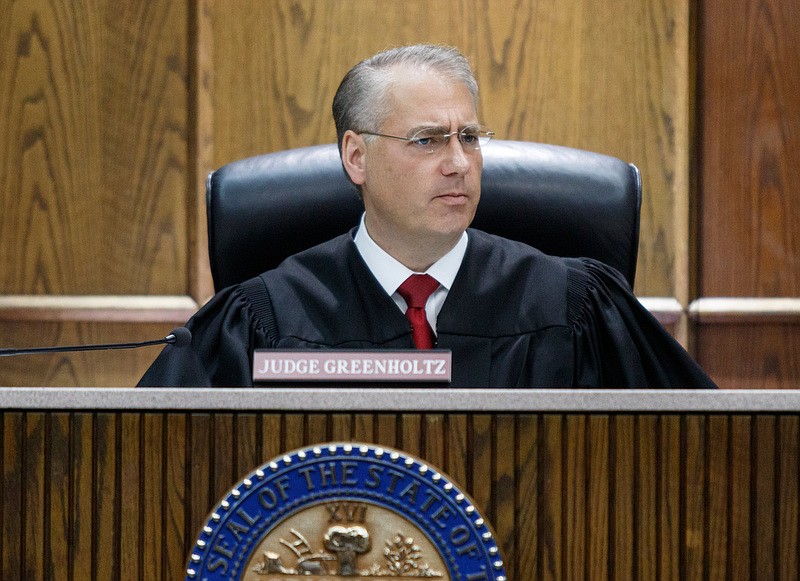Hamilton County Criminal Court Judge Tom Greenholtz on Friday dismissed all racketeering conspiracy charges against 55 alleged members of the Alton Park Bloods gang, citing the state's failure to meet the law's requirements to show conspiracy.
Fifty-four alleged gang members were indicted in March 2018, marking the first time a street gang in Hamilton County had been prosecuted as a criminal enterprise under the state's Racketeer Influenced and Corrupt Organizations Act.
That case was dismissed and replaced with a more detailed criminal indictment that added a 55th defendant and better described what each person was accused of.
It essentially charged each defendant with one count of engaging in criminal gang offenses (racketeering) and one count of conspiracy to engage in criminal gang activity (racketeering conspiracy). It also included 23 other charges, but not all defendants faced all 23 charges.
In August, though, the racketeering charge was dismissed in 47 of the 55 cases after Greenholtz ruled the state failed to show a pattern of racketeering activity as defined by state law. Only eight remain charged with racketeering.
Prosecutors had to show gang members committed at least two crimes within two years of each other and that the crimes were committed on the gang's behalf. But the indictment failed to state when some defendants actually committed the alleged crimes; some crimes were committed more than two years apart; and in some cases, prosecutors listed only one alleged crime.
"It is clear, therefore, that the Grand Jury has not properly alleged a pattern of racketeering activity," he wrote in the August order.
Now, the conspiracy charge has also been thrown out.
"I promised the people of Hamilton County we would try every tool available to curb gang violence, including using a poorly written state RICO law," Hamilton County District Attorney Neal Pinkston said in a statement. "Hopefully, our lawmakers will recognize the problem they've created and give us a better version to work with in the future. Until then, we will continue to use the current law within the constraints provided by Judge Greenholtz's ruling."
But in a 27-page opinion, Greenholtz noted several problems with the indictment itself.
First, the indictment failed to state exactly which type of racketeering crime the defendants allegedly conspired to commit, meaning it could be several.
And that raises multiple problems: The defendants didn't know against which crime they'd need to defend; it could create double jeopardy; and a jury wouldn't be able to reach a unanimous verdict if they chose to convict on one crime but not another.
Double jeopardy occurs when a defendant is tried a second time for an offense that was already tried and resulted in conviction or acquittal.
The indictment also failed to show that all of the defendants were in agreement with each other.
Tennessee's racketeering law specifies that co-conspirators must all be in on the conspiracy, which is a "significant limitation," Greenholtz wrote.
Federal and other state laws do not have that requirement. Defendants could conspire with the enterprise itself (in this case, the gang) or with a leader instead of specifically with every single member.
Tennessee's law is narrow by design.
One of the law's co-sponsors had historically been opposed to racketeering legislation because "it would hurt smaller people" rather than major dealers, Greenholtz noted.
"One way to avoid the practical consequences of this language, of course, is for a grand jury to allege the presence of multiple conspiracies involving a small number of participants," Greenholtz wrote.
Additionally, the indictment listed no factual basis for its alleged conspiracy, something that is required by state law.
Finally, Greenholtz notes, the state legislature has made clear that to constitute a pattern, the racketeering activity, "cannot consist of 'isolated incidents.'"
"Yet, this is all that the Grand Jury has alleged in [the conspiracy charge] - isolated incidents of conduct without facts showing any interrelation.
"In other words, the State could prove every fact [individually] and still not prove the conspiracy offense with respect to any co-defendant."
For those reasons, Greenholtz ordered the conspiracy charge dismissed for all defendants.
Eight defendants are still charged with racketeering.
Since the initial indictment, one of the accused, Antwon Lee, was shot and killed in April 2019.
A lot is at stake in this gang racketeering case. Eight men are charged in six previously unsolved homicides, including the May 2016 slaying of state witness Bianca Horton. Additionally, Andre Grier, Courtney High and Charles Shelton potentially face the death penalty if convicted of that crime.
Contact Rosana Hughes at rhughes@timesfreepress.com or 423-757-6327 with tips or story ideas. Follow her on Twitter @Hughes Rosana.

